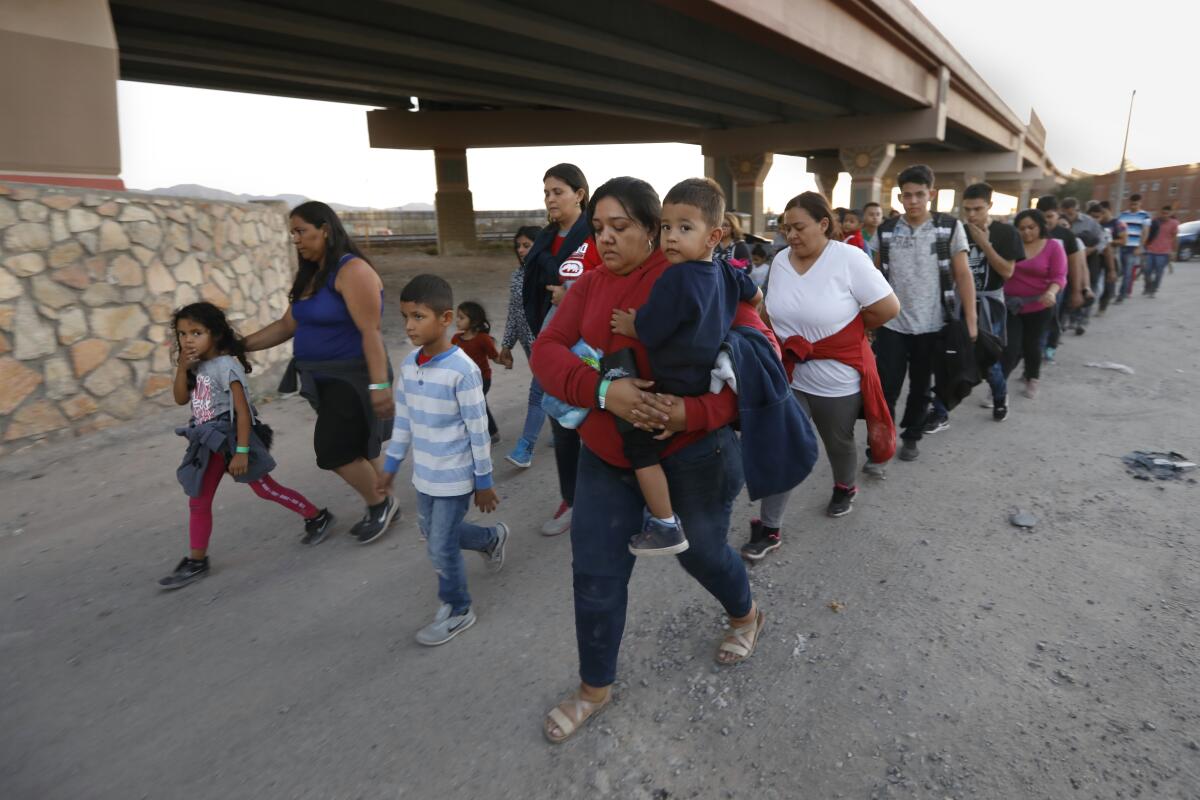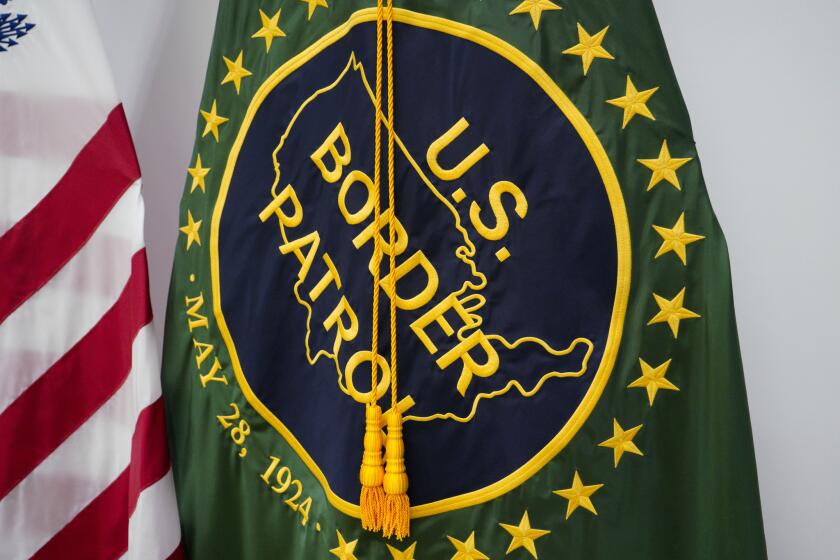U.S. border agency said it ‘rescued’ a Honduran woman and newborn. Then it separated them and detained her

- Share via
WASHINGTON — “Border Patrol Agents Rescue Woman in Labor,” the release from Customs and Border Protection read on Friday.
What border officials didn’t mention was that, just hours after their purported rescue, they separated the Honduran immigrant from her newborn and detained her pending possible removal, according to lawyers and advocates.
Border agents responding to a 911 call Wednesday night found the woman shortly after she’d delivered her baby alone in a field in Eagle Pass, Texas. The officials first transported mother and child to a nearby hospital, then the child was airlifted to a neonatal intensive care unit in San Antonio, hours from where they held her mother in custody.
(The Customs and Border Protection release incorrectly said the call came Thursday, as appeared in earlier reporting, and agents apparently provided the hospital with the wrong date of birth.)
“They told her she was going to be sent back to Mexico without her baby,” said Amy Maldonado, who is legally representing the mother. The woman’s cousin is in Sacramento and spoke with her by phone from detention. The newborn is a U.S. citizen.
After The Times story published, Customs and Border Protection released the mother, who Saturday morning reunited with her newborn in the San Antonio neonatal unit, lawyers and advocates confirmed.
Neither acting Customs and Border Protection Commissioner Mark Morgan nor agency spokespeople responded to requests for comment before publication Friday.
Hours later, Austin Skero, chief patrol agent for the Del Rio sector, responded in a tweet to The Times, saying that agents had to separate the mother and baby due to the San Antonio hospital’s COVID-19 policy for the neonatal unit, which the hospital immediately disputed.
Skero suggested that the mother might soon be released from Customs and Border Protection detention in Eagle Pass, transported to San Antonio and reunited with her newborn.
“When the hospital advised the child’s condition was improving, and may soon be released, agents began processing the mother for release,” he tweeted. “Upon release, the mother will be transported to San Antonio and reunited with her child.”
According to Skero, “Due to strict COVID-19 restrictions in the neonatal intensive care unit, the mother could not join the child in the aircraft or at the hospital.”
Leni Kirkman, representative for University Hospital in San Antonio, told The Times in an interview the statements were not correct.
“That is definitely not the hospital policy,” she said. “We do not separate babies and parents.”
Even during a surge in COVID-19 cases in Texas, “which fortunately we’re not in now,” she said, “the parents of NICU babies got to be with their baby. That was not something we backed off on. Babies need to be with their parents.”
Whatever transport Customs and Border Protection may have used — the hospital doesn’t own any planes — Kirkman said, “it has nothing to do with our hospital.”
The hospital’s COVID-19 policy for the neonatal ICU, publicly posted on its website, also states:
“To ensure a safe care environment, University Hospital is currently permitting one visitor per day between the hours of 8 a.m. and 8 p.m. with the exception of individuals deemed necessary to the patient’s care. Visitors deemed necessary to the patient’s care include:
- 1-2 parents or guardians for pediatric and neonatal intensive care unit (NICU) patients
- 1 support person for labor & delivery/postpartum patients”
According to the initial release from Customs and Border Protection, the Homeland Security Department parent agency to Border Patrol, the woman and her newly delivered baby “were both in need of medical assistance.”
“A Border Patrol EMT provided critical care to the mother, a Honduran national and her newborn until EMS arrived on scene, EMS transported the family to a local hospital for further evaluation and treatment,” the statement said. “After receiving medical care, the infant and her mother will be processed as per CBP guidelines.”
As for the mother’s account that agents told her she’d be sent back to Mexico without her baby, Skero, the Del Rio sector chief, said: “My agents did not tell her that.”
On Sunday, Border Patrol Chief Rodney Scott, the head of the agency, tweeted a joint statement with Morgan, the acting CBP commissioner, saying, “These agents did everything in their power to ensure the safety of the baby, as well as the mother.”
Amy Cohen, a child psychiatrist and executive of nonprofit Every Last One, who first learned about the case from a friend of the family, said the hospital informed her that the baby has to be in the hospital for another seven to 10 days and was “in distress” when born. The mother has since received medical care at the San Antonio hospital as well; Customs and Border Protection “had her sleep on the floor at the detention center,” Cohen said.
Almost exactly three weeks ago, Cohen responded to a similar case of a mother who had an emergency birth for a ruptured uterus, and Customs and Border Protection kept her apart from her baby for roughly four days, Cohen said. She’s since been released from detention.
“These babies need their mothers,” Cohen said. Speaking of the Honduran mom, she added, “And we doubt she’s going to get much postpartum care in CBP detention, a breast pump or anything to treat any injuries she has from giving birth by herself in the desert.”
The Honduran mother, whose name was not released, had sought asylum at the border in south Texas earlier this year with her older child, who is 6 years old, but border officials put them into the controversial “Remain in Mexico” program, officially termed the Migrant Protection Protocols, or MPP, sending them back to Mexico and giving them a notice to appear dated May 5.
The complaint, filed with the Department of Homeland Security office of the inspector general, is a latest in a series by the ACLU advocating for better conditions for asylum-seekers in custody.
Under MPP, tens of thousands of asylum seekers have been forced back to dangerous Mexican border towns to await hearings in the United States, some for more than a year. Citing the COVID-19 pandemic, the Trump administration closed the U.S.-Mexico border in March to all nonessential travel and indefinitely postponed most MPP hearings. The family has a court hearing in December, Cohen said.
The mother, like hundreds of other parents waiting in refugee camps along the border, sent her 6-year-old child across alone to seek asylum three weeks ago, according to Maldonado and Cohen. The mother and her child had been kidnapped and held at gunpoint for two weeks in Nuevo Laredo, Cohen said. Advocates and experts have documented more than 1,000 cases of asylum seekers put into Migrant Protection Protocols who then have been kidnapped, raped and assaulted in Mexico while waiting for hearings in the U.S.
That child was released this week from the custody of the Office of Refugee Resettlement, the Health and Human Services agency tasked with the care of unaccompanied children, and is with the cousin in Sacramento, Cohen said. The mother and newborn, once medically cleared, are expected to join her other child and family in California.
“She was desperate,” Maldonado said of the mother’s decision to cross later herself.
On Friday, Maldonado said that she and other advocates, along with Rep. Elissa Slotkin (D-Mich.), Maldonado’s representative, were trying to reach the mother in Customs and Border Protection custody in Eagle Pass in order to give her forms that would allow the sharing of medical information about her newborn, who is reportedly ill, as well as for the mother to access her legal representation.
The American Civil Liberties Union has challenged the Homeland Security Department over its “treatment of pregnant people, or people in active labor, delivery, or post-delivery recuperation in CBP custody or subject to the MPP,” and called for an investigation into returning pregnant women to Mexico under MPP.
The Homeland Security inspector general has also opened an investigation into the department’s treatment of pregnant women.
According to an April report from the Government Accountability Office, more than 100 complaints were filed about Customs and Border Protection and Immigration and Customs Enforcement’s care of pregnant women from January 2015 to April 2019. And according to a spreadsheet produced by the Department of Homeland Security’s Office of Civil Rights and Civil Liberties in response to a public records request by the ACLU, at least 45 incidents occurred with pregnant women in the agency’s custody from January 2017 to last year.
Another document obtained through a public records request by Human Rights First, dated May 1 and describing Border Patrol’s COVID-19 response, says, “USBP reserves MPP as reliable alternative for expelling ... pregnant females.”
Invoking the pretext of the pandemic and just weeks away from the November election, Trump officials have sought to speed up removals of immigrants.
“Anyone who is pregnant requires heightened medical care,” Mitra Ebadolahi, senior staff attorney for the ACLU, said in a January statement about its complaint. “CBP and Border Patrol detention facilities are categorically unsuitable to provide this level of care.”
More to Read
Get the L.A. Times Politics newsletter
Deeply reported insights into legislation, politics and policy from Sacramento, Washington and beyond. In your inbox twice per week.
You may occasionally receive promotional content from the Los Angeles Times.












